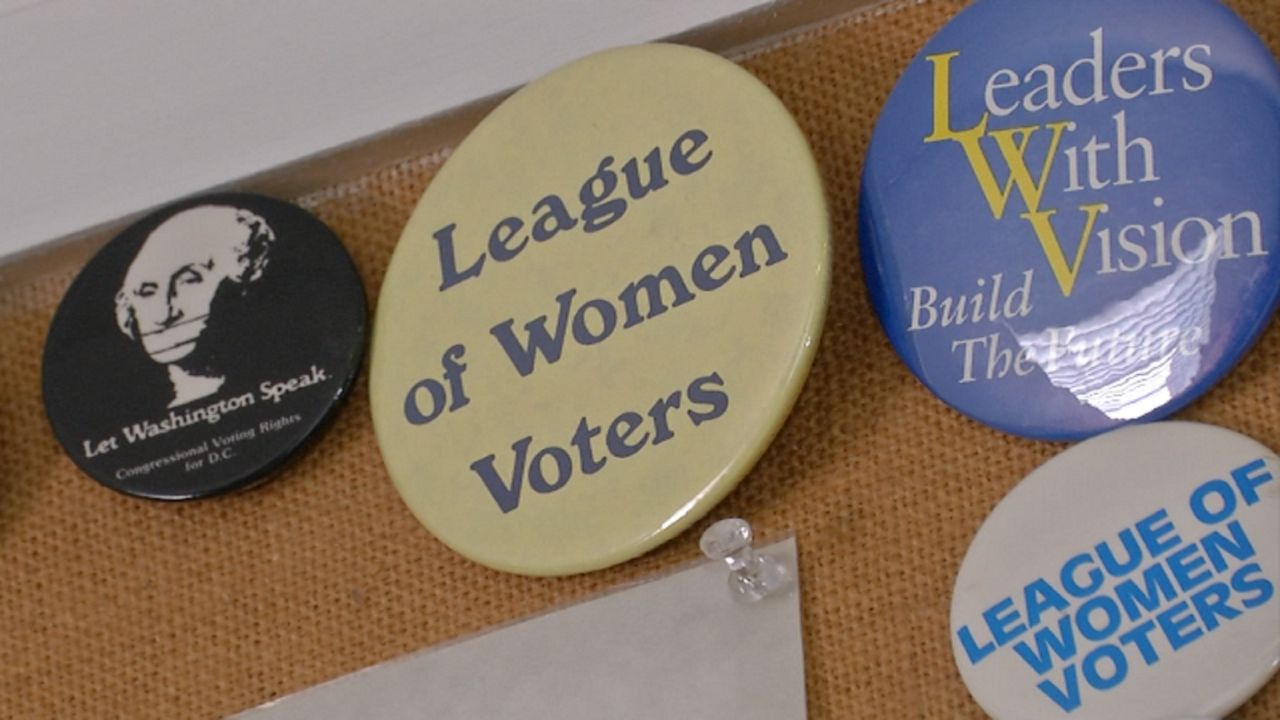LEXINGTON, Ky. — The League of Women Voters of Lexington, one of the state’s eight local branches of the voter education non-profit, had big plans for the summer of 2020.
What You Need To Know
- Groups that register voters getting creative in the time of coronavirus
- Door-to-door canvassing and in-person events replaced by online events
- Voter registration slowed during the pandemic
- Deadline to register in Kentucky is Oct. 5
Not only does this year include a presidential election and a U.S. Senate race in Kentucky, but it’s also the 100th anniversary of the 19th Amendment, guaranteeing women the right to vote. In a year unburdened by a pandemic, group members in their white suffragette dresses would mark the milestone at ceremonies and celebrations, while also running a vigorous campaign to register new voters at libraries, farmers markets, community festivals, and public housing complexes.
“We had all these big plans,” said Jennifer Jackson, the group’s voter services chair. “We were so excited.”
Instead, Jackson’s efforts have largely been moved online, with a few novel forays in the real world, including posters with voting information that will be distributed around the city, sandwich boards with QR codes for outdoor spaces, and a postcard writing campaign.
With just over three weeks until Kentucky's Oct. 5 voter registration deadline, political campaigns and parties, non-profit groups, and the Secretary of State’s office are in their final push to register new voters. And with the pandemic still with us, they’re getting creative as they try to make up for a coronavirus-induced lull in new registrations.
On Thursday, Secretary of State Michael Adams held the first of several drive-thru registration events, allowing Kentuckians to pick up voter registration materials, hand sanitizer, and a mask promoting the state’s voter registration website, GoVoteKy.com.
“We’ve had a 90 percent drop year-over-year compared last summer to this summer,” Adams told reporters Thursday. “So we’re going out of our way to encourage people to register to vote.”
The cause of the decline is hardly a surprise. Like nearly every other part of daily life, voter registration ground to a halt during the nationwide shutdown this spring. With schools and driver’s licenses offices closed and public events canceled, only 504 people were added to Kentucky’s rolls in March. That was down from the 7,000 people who registered in February. By the end of July, numbers were ticking back up, with more than 21,000 voters registered between June 24 and July 31. But the pandemic was still having an effect. In 2019, 167,044 people registered during June and July.
This year’s numbers would no doubt be higher if groups such as Kentuckians for the Commonwealth were operating as usual. Absent the coronavirus, the statewide social justice organization would be tabling at festivals, college campuses, and grocery stores, registering 150 to 200 voters a day. Instead, it’s training other organizations to register people and adapting its direct outreach to the times. Instead of canvassing door-to-door, volunteers are putting large stickers with voting information on the front doors of homes in low-income areas. They’re also phone and text banking the 170,000 people with felonies whose voting rights were restored by Gov. Andy Beshear’s December executive order.
The League of Women Voters of Louisville has moved much of its voter registration efforts online too. Rather than engaging directly with unregistered voters at community events, it’s training members to register those in personal networks.
“What we’re envisioning is that we connect, and then they connect with others,” said group president Margie Charasika. “We’re hoping that it has that ripple effect.”
Some organizations are still contacting potential new voters in person. Jessica Clark, a volunteer with the Kentucky Democracy Project, has been staffing a table outside of Mi Mi's Southern Style Cooking in Lexington for weeks. She’s recently begun moving it to other areas in the city as she and a partner attempt to sign up more voters. Each time they speak to a potential new voter, they have a smartphone ready for them to register. “I'm making sure we can sign them up right then,” Clark said.
Democratic Senate candidate Amy McGrath is also operating in person, with small, socially distanced events. On Aug. 1, she held four events in four cities aimed at registering people with newly-restored voting rights and those from historically disenfranchised groups. This Saturday, she will hold events at four college campuses across the state, each aiming to give people a chance to meet the candidate and “learn how you and your friends can register to vote in Kentucky,” according to online listings.
The Republican Party of Kentucky, meanwhile, has staff and volunteers working to add voters to the rolls at a combination of digital and in-person events, said Republican Party of Kentucky spokesperson Mike Lonergan. The Kentucky Democratic Party is working with CampaignOS, an online platform that allows donors to fund hyper-local voter registration efforts targeting “people who are prime to be registered,” said Kentucky Democratic Party spokesperson Marisa McNee.
These methods have their limitations, particularly when it comes to reaching people who don’t have reliable internet access or don’t attend events held by candidates and political parties. KFTC is attempting to reach those voters by leaving literature at their doors or tabling in front of Black-owned businesses. The League of Women Voters in Lexington is working with food banks and shelters in registering their clients. And in West Louisville, The Voter Engagement Brigade is holding a concert this Saturday with local musicians, catering, and door prizes that it’s calling “The Chickasaw Experiment for Voter Registration.”
“I’m trying to reach people that have not voted before,” Clark said. “I’m trying to reach people that have lost their interest over the years to vote. Veterans — believe it or not there are a lot of veterans who are not registered to vote. I’m trying to reach seniors, Hispanics, Latinos — I’m just trying to encourage everybody to vote.”



